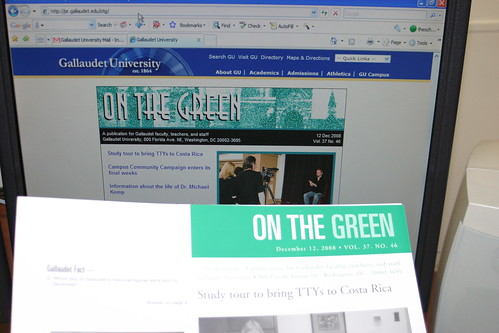
Written by Rhea Yablon Kennedy
Just about the time the
Washington City Paper featured
a story about how the Sunday
Post could slim down, Gallaudet started its own paper-saving endeavor. The concept was simple: print less
On the Green to be more "green."
By way of a little background,
On the Green (a.k.a.
OTG) is a campus newsletter published every two weeks during the Gallaudet school year. It has appeared in the mailboxes of faculty, staff, and administration (with additional copies available in the Alumni House, the JSAC, and the Visitor's Center) for longer than I've been alive. When I joined the Public Relations staff, I knew my main responsibilities would include writing and shooting photos for that inimitable communiqué. Working with the rest of the PR team, I did this dutifully for two years, and put mailing labels on the three boxes full of
OTGs that arrived twice a month for distribution to the campus.
After 50-odd sessions of labeling about 1,500 of these things, I got to thinking. Mostly, I thought: this is a lot of paper! Why not give people a paper-free option? It wasn't just me thinking this way, I should point out. I definitely had some hints about the paper used for
OTG and other publications.
My first reaction was perhaps a little too much. In November 2007, I saw to it that
OTG would go completely paperless. It was all online, all at once, with nothing but a PDF version to print for the hard copy enthusiasts. From the beginning, I heard laments about missing the 11-by-17-inch glossy paper, which let the campus get its news like people have for hundreds of years. "I want something I can hold in my hands," the stalwarts said. "I don't want to squint at a screen." We got the strong message that we should go back to paper, and so we did—for everyone… until this December.
As a sort of experiment, we offered
a paperless option to the campus starting December 10. Subtly advertised in the
Daily Digest, it wasn't obtrusive. And it didn't threaten any sweeping change of readership paradigm. Responses did come in, though, and within the first two days we were able to eliminate 25 paper copies of
OTG. That's four to six ledger-sized sheets saved per person every two weeks. A few departments have told me they're surveying their readers, and will get back to us with a final slimmed-down count soon.
In addition to this, we'll put fewer copies of the newsletter at Campus Activities, and keep track of how many people really take.
If we offer the paperless option again at the start of the spring semester, I'm sure we'll see even more interest. So that's a small but solid step toward making Kendall Green more green. If 118 pounds of recycled newspaper can save a tree, we'll be well on our way to a thankful grove by next holiday season.
What can you do? If you work at Gallaudet or know someone who does, tell them they can go paperless with OTG. They can just email public.relations[at]gallaudet.edu with a request to be removed from the mailing list.
Daily Digest will announce when a new
OTG is available to read online.












